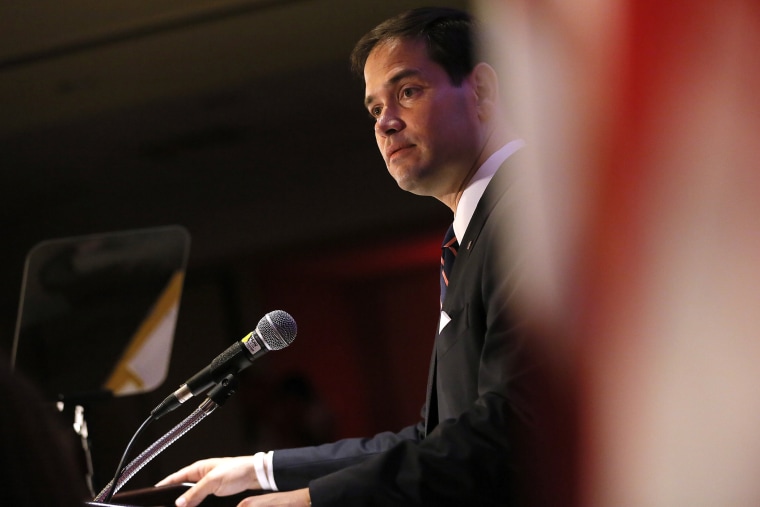Sen. Marco Rubio (R-Fla.) traveled to Detroit yesterday, where he
delivered remarks on his tax plan -- a key component of his presidential campaign. Bloomberg Politics had a
good summary of the Florida Republican's pitch:
Rubio's plan slashes the corporate tax rate and scrap taxes on dividends, estates and capital gains. It also creates a $2,500 child tax credit and replace the standard deduction and personal exemption with a refundable personal credit. It's not clear how the plan, co-authored by Senator Mike Lee and released earlier this year, a Utah Republican, would be paid for. Democrats say it would increase the deficit.
When dealing with tax plans from Republican presidential candidates, it's best to think about the proposals in terms of degrees of radicalism. Sen. Rand Paul's approach to tax policy, for example, is ... how do I put this gently ...
not normal. The Kentucky Republican has a plan that would effectively dismantle much of the federal government and its operations.
By this standard, Rubio's approach seems almost moderate. It even expands some middle-class tax credits, which helps reinforce the impression that the plan isn't completely stacked in favor of the wealthy.
That said, the rich would make out like bandits under Rubio's vision of tax policy. The Center on Budget & Policy Priorities
published an analysis in March of the Rubio/Lee package, which concluded the plan is "outrageously" tilted "in favor of the country's highest-income people." The "big losers" under the plan, the CBPP added, "would be the working-poor people who feed and bathe the elderly, care for preschoolers, clean offices, and perform other essential tasks. The big winners would be the country's highest-income 400 filers, at a cost of much higher deficits."
It may not be quite as radical as what some of his 2016 rivals are recommending, but Rubio's plan is
far to the right of anything proposed by George W. Bush, John McCain, or even Mitt Romney.
But as a matter of politics, the far-right Floridian believes he can overcome these details. In fact, by some measures, Rubio seems to think the substance isn't nearly as important as his biography, which as
Jon Chait noted yesterday, is apparently supposed to trump policy.
"If I'm our nominee ... We will be the party of the bartenders and the maids, of the people that clean our rooms and fix our cars," Rubio promises. The choice of working-class occupations is hardly an accident -- Rubio is describing the occupations held by his parents when they came to the United States. Rubio's idea of a "party of" is quite literal -- he means the party would be identified with the classes of the parents of its candidate rather than, say, its policies. [...] Rubio is unusually clear about his strategy to respond to Clinton's arguments about policy with appeals to his background. "If I'm our nominee, how is Hillary Clinton gonna lecture me about living paycheck to paycheck?" he said at the first Republican debate. "I was raised paycheck to paycheck. How is she -- how is she gonna lecture me -- how is she gonna lecture me about student loans? I owed over $100,000 just four years ago." This is Rubio's plan. Clinton will attack the Republican economic program, and Rubio will talk about his life story.
It's a proposition predicated on the assumption that the public simply does not, and will not, care about policy and its outcomes. Rubio is arguing, in effect, "Admire my biography, not my plan."
Voters are supposed to believe the candidate with the tax plan "outrageously" tilted towards the rich is actually a middle-class champion. Why? Because of his student loans and what his parents did for a living. Rubio's personal story is supposed to be every bit as important, if not more so, than how his agenda would affect Americans' personal lives.
It's a message custom made for a post-policy party.
